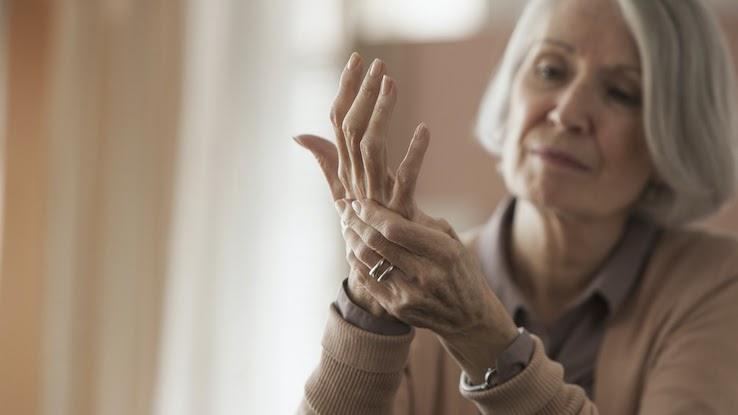Living Room Furniture For Small Rooms

Osteoarthritis (OA) is an age-related form of arthritis. OA is what's known as a degenerative joint disease, and it tends to occur most commonly in the hips, back, hands and feet. In the United States, over 32.5 million adults are living with OA, which has no known cure. However, certain activities can reduce your risk of developing OA, and there are steps you can take to relieve the associated discomfort once you've been diagnosed with this health condition.
What Is Osteoarthritis?
OA is a painful joint disease that occurs when the cartilage within a joint starts to break down. Cartilage normally serves as a shock-absorbing cushion between bones, and its breakdown results in bones rubbing directly against one another during movement. This friction causes the bone to thicken, which can cause spurs (bony growths) to develop between joints.
Stiffness, pain and loss of movement may occur as the joint lining becomes inflamed after long-term cartilage breakdown and spur growth. Over time, the abrasions between bones that occur when they rub together may result in permanent joint damage.
Symptoms of Osteoarthritis
Symptoms of OA may vary from person to person. However, most people living with this condition tend to experience at least one of the following:
- Joint soreness
- Joint pain
- Joint stiffness following periods of inactivity
- Morning stiffness that dissipates quickly
- Decreased range of motion
- Changes in posture, walking and bodily coordination
- Pain in weight-bearing areas of the body, such as the knees, hips, spine and extremities
What Causes Osteoarthritis?
As a person ages, it's normal for their cartilage to lose its elasticity. However, intensive stress such as vigorous exercise can make the cartilage break down faster and make a person more likely to develop OA.
There are two types of OA: primary and secondary. Primary OA is known as the more common "wear-and-tear" OA and is usually associated with aging. Secondary OA may happen from a variety of modifiable risk factors, including prior injuries, weight and genetics.
While the specific cause of OA is still unknown, there are several factors that can increase your risk of developing this condition:
- Weight: Individuals with obesity are at an increased risk of developing OA, as their joints may experience stress due to increased weight-bearing.
- Age: OA is known as the "wear-and-tear" form of arthritis and is associated with increasing age.
- Anatomical sex at birth: OA affects people assigned female at birth more than those assigned male at birth, particularly after the age of 50.
- Genetic predisposition: OA often runs in families. In addition, an individual with arthritis in one area of their body is at an increased risk of developing OA in another area, such as their knees or hands.
- Past injury or joint overuse: Prior sports or occupational injuries (such as physical labor, repetitive motion or frequent heavy lifting) can contribute to the development of secondary OA.
- Having other illnesses and deficiencies: People with other forms of arthritis have a greater chance of developing the condition. In addition, deficiencies in certain hormones and vitamins C, D and E may also play a role in the development of OA.
Diagnosis & Testing for Osteoarthritis
To diagnose OA, your doctor will first take a thorough medical and social history in order to build a complete picture of your condition. Included in this medical history will be a review of your past and present symptoms.
Next, your physician will perform a physical exam to check your joints for swelling, abnormal growths and changes in range of motion. Following the physical exam, you will likely undergo imaging, such as an X-ray or magnetic resonance imaging (MRI). Depending on the results of your imaging, your physician can recommend a treatment protocol and activity adjustments.
Treating Osteoarthritis
There are no known cures for OA, but there are steps you can take to prevent or alleviate the symptoms you experience:
- Weight control: For individuals with obesity, weight control may be the best self-management technique to alleviate OA symptoms. Losing weight will help alleviate additional stress on the joints.
- Physical activity: Moderate exercise can strengthen the surrounding musculature of affected joint muscles and increase flexibility, thus reducing stiffness. However, it's important to consult a physician for a specific exercise plan because overly vigorous exercise may worsen your symptoms.
- Medications: Your physician may prescribe medication to help reduce joint inflammation and pain, ranging from topical creams to injections within the joint.
- Physical therapy: Physical therapy can target and strengthen certain muscles to increase flexibility, in turn helping joint mobility. Occupational therapy can also teach you how to manage your job responsibilities without further stressing or damaging your joints. These therapies may employ braces or splints to help you lead a more comfortable life with OA.
- Surgery: Surgery and joint replacement may be reasonable treatment options for more advanced cases of OA. During surgery, surgeons can remove or repair damaged tissues, cartilage and bone spurs. You should consult your physician for the most ideal treatment option.
- Diet: Antioxidant intake and vitamins C, D and E are helpful in counteracting inflammation. Eating a balanced and healthy diet can also help improve your body's natural anti-inflammatory abilities.
Resource Links:
https://www.arthritis.org/diseases/osteoarthritis
https://www.mayoclinic.org/diseases-conditions/osteoarthritis/diagnosis-treatment/drc-20351930
https://www.versusarthritis.org/about-arthritis/conditions/osteoarthritis/
https://www.niams.nih.gov/health-topics/osteoarthritis
https://www.cdc.gov/arthritis/basics/osteoarthritis.htm
MORE FROM SYMPTOMFIND.COM
Living Room Furniture For Small Rooms
Source: https://www.symptomfind.com/health/osteoarthritis-condition?utm_content=params%3Ao%3D740013%26ad%3DdirN%26qo%3DserpIndex

Komentar :
Posting Komentar